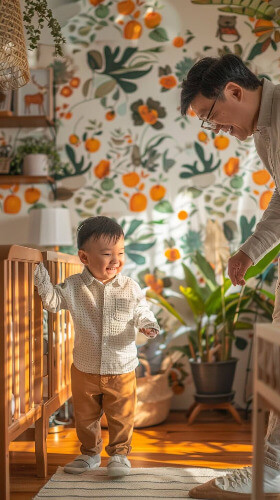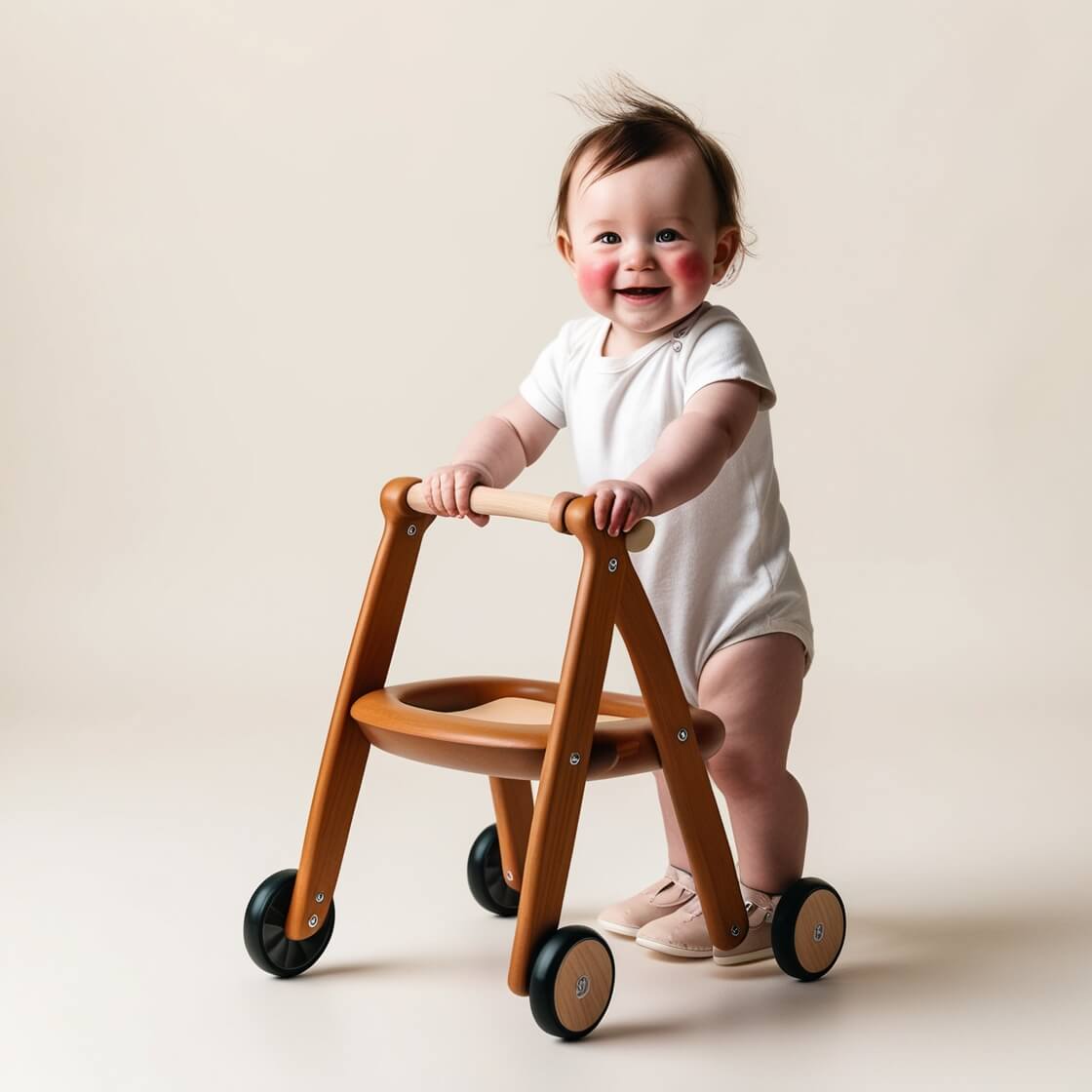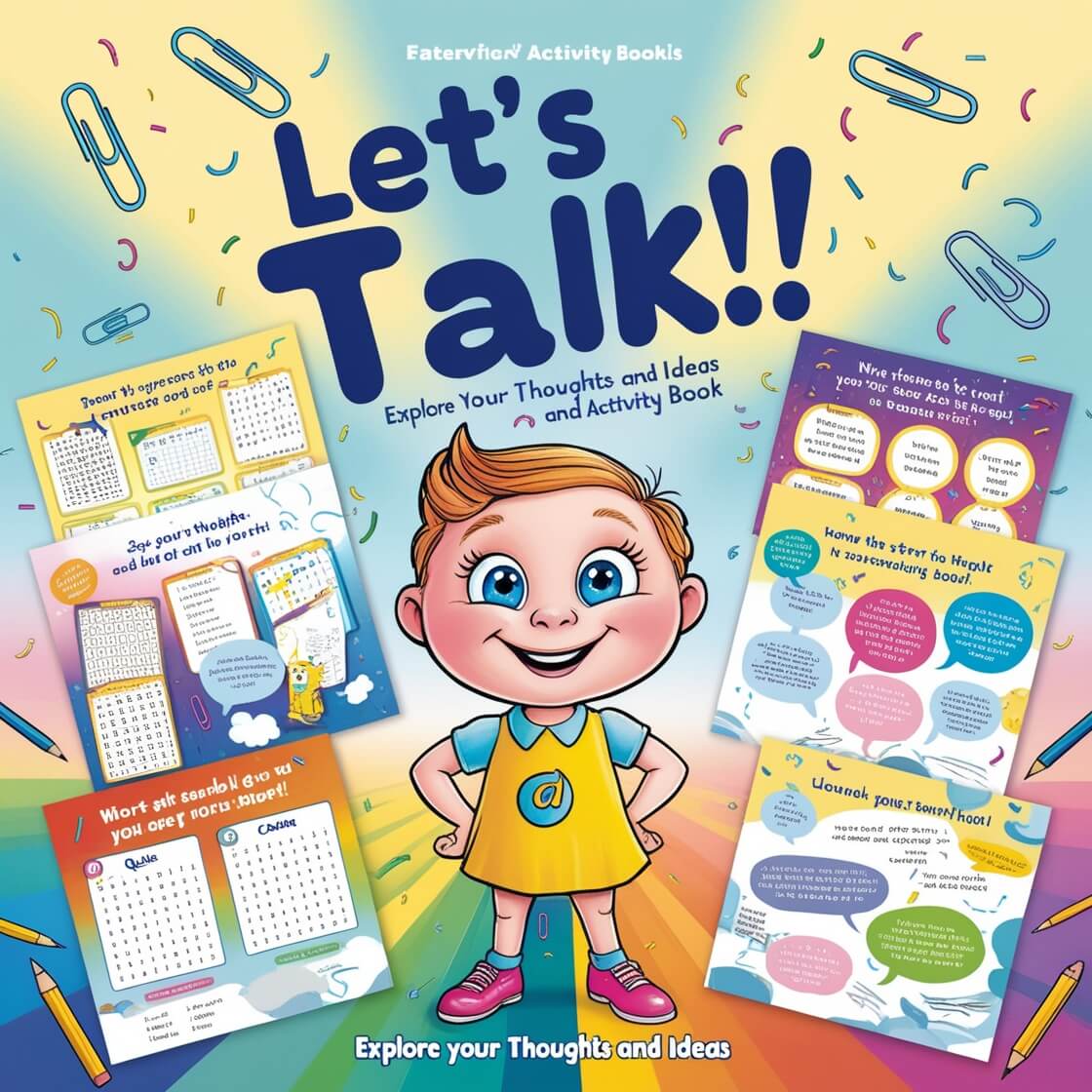Watching Our Babes Grow: Walking and Talking at Their Own Pace
Worried Your Toddler Isn’t Walking Yet? This Short Story Will Ease Your Mind
Every child's journey to walking and talking is unique and full of wonderful surprises.
You celebrate your child’s milestones with pride, but sometimes you get all worried when they don’t follow the same timeline as others.
I have compiled some examples of children who have learnt to walk and talk at their own pace.
We’ll also check out how different parenting methods influenced their progress and remind us that each child’s path is their own.
Emma’s Journey: Crawling First, Walking at 16 Months
Emma was always a curious little explorer. She started crawling around eight months, using her hands and knees to get into every nook and cranny of the house.
 Small child out in pumpkin field bending over to touch a pumpkin and laughing
Small child out in pumpkin field bending over to touch a pumpkin and laughingBy 16 months, she was confidently walking. Her parents, Sarah and John, believed in a hands-off parenting approach.
They provided Emma with a safe environment to explore and lots of encouragement but didn’t rush her milestones.
Sarah recalls, “We wanted Emma to develop at her own pace. We encouraged her curiosity and let her take the lead.”
Emma’s gross motor skills developed gradually. Learning to crawl first helped her to build her muscle strength and coordination required for walking.
Emma's mom and dad were very supportive and played a significant role in her progress.
In terms of talking, Emma said her first word, “mama,” at around 12 months. By 18 months, she was stringing together simple sentences.
Sarah and John often read to her, engaging her in conversations about the stories.
Their interactive approach to reading and talking with Emma helped stimulate her language development naturally.
Liam’s Leap: Skipping Crawling, Walking at 12 Months
Liam had a different story. He never really crawled but instead preferred to scoot on his bottom.
 Small boy inside with dad walking along railing and holding onto it. He is looking towards his dad and laughing.
Small boy inside with dad walking along railing and holding onto it. He is looking towards his dad and laughing.By his first birthday, Liam surprised everyone by taking his first steps.
His parents, Mike and Lisa, practiced a more structured parenting method.
They believed in setting specific goals and gently guiding Liam towards them.
“We noticed Liam wasn’t interested in crawling, so we focused on activities that encouraged walking,” Mike shared.
They used toys that Liam had to pull up on and provided plenty of opportunities for him to practice standing and cruising along furniture.
When it came to talking, Liam was a bit slower. His first word came around 14 months, and by 20 months, he had a vocabulary of about 20 words.
Mike and Lisa made sure to talk to Liam frequently and used a lot of descriptive language to help him learn new words.
They also used baby sign language to help Liam overcome the communication gap, which eased his frustration and encouraged verbal communication.
Ava’s Adventure: Walking at 10 Months, Talking at 24 Months
Ava was always on the move. She started walking at an impressive 10 months, skipping the crawling stage entirely.
 Mom and dad a following proudly behind their child as they walk for the first time.
Mom and dad a following proudly behind their child as they walk for the first time.Her parents, Kelly and David, were firm believers in child-led parenting.
They let Ava explore her abilities naturally and provided plenty of encouragement without pressure.
“Ava just wanted to move,” Kelly laughed. “We gave her space and lots of cheering from the sidelines.”
Ava’s early walking meant she had lots of time to refine her gross motor skills.
She loved climbing, running, and exploring her environment, which kept her physically active and engaged.
However, Ava’s talking came a bit later. She said her first word at 18 months and only started forming simple sentences by the time she was two years old.
Kelly and David didn’t worry too much. They knew every child develops differently. They continued to read to Ava, sing songs, and talk with her regularly.
Ava’s verbal skills eventually caught up, and she’s now a chatty preschooler with a rich vocabulary.
Noah’s Path: Crawling at 12 Months, Walking at 18 Months
Noah was a late bloomer when it came to gross motor skills. He started crawling at 12 months and didn’t take his first steps until he was 18 months old.
His parents, Jane and Peter, took a mixed approach to parenting. They combined structured activities with plenty of free play.
Jane remembers, “We encouraged Noah with toys and games that promoted movement but also gave him space to figure things out on his own.”
 Small boy crawling on hardwood floor while smiling at the camera.
Small boy crawling on hardwood floor while smiling at the camera.Noah’s slower pace in walking didn’t worry them; they knew he would walk when he was ready.
Their balanced approach helped Noah develop his motor skills without feeling rushed.
Noah was an early talker, though. He said his first word at 10 months and by 15 months, he was speaking in two-word phrases.
Jane and Peter were diligent about reading to him daily and narrating their activities. This constant verbal interaction seemed to stimulate Noah’s language development early on.
Sophia’s Story: Early Walker and Talker
Sophia was a little whirlwind of energy. She started walking and talking at nine and 12 months.
 Small girl walking for the first time, laughing and holding onto her mom's hand.
Small girl walking for the first time, laughing and holding onto her mom's hand.Her parents, Amy and Chris, practiced an attachment parenting style.
They believed in close physical and emotional bonding, which they felt helped Sophia feel secure and confident.
“We carried Sophia a lot, talked to her about everything, and responded to her needs quickly,” Amy explained.
This approach seemed to foster a strong sense of security in Sophia, which might have contributed to her early milestones.
Sophia’s gross motor skills were impressive. By her first birthday, she was running around, exploring the world with boundless energy.
Her language skills developed rapidly, too. Amy and Chris made a point to engage Sophia in conversations, ask her questions, and listen to her responses.
Their nurturing environment helped Sophia thrive in both walking and talking.
Jack’s Journey: Late Bloomer in Walking and Talking
Jack’s story is a reminder that it’s perfectly okay to develop at your own pace. Jack started crawling at 14 months and took his first steps at 22 months.
His parents, Laura and Tom, practiced a relaxed and supportive parenting style. They believed in giving Jack plenty of time and space to develop naturally.
“Jack always did things in his own time,” Laura said. “We made sure he felt loved and supported, but we never pushed him.” Jack’s gross motor skills developed slowly, but steadily.
Laura and Tom got him a push walker and some soft climbing blocks to help him with his balance and movement
Talking came a bit late for Jack, too. He said his first word around 20 months and by 30 months, he was beginning to form short sentences.
 Small boy crawling while mom and dad cheer him on with excitement.
Small boy crawling while mom and dad cheer him on with excitement.Laura and Tom were patient and encouraging. They spent lots of time reading books to him, singing and just talking to Jack in general.
They did all they could to boost Jack’s confidence making sure to celebrate every achievement, no matter how small.
Now, Jack is a vibrant and chatty three-year-old. His journey might have been slower than others, but he reached his milestones in his own time.
Laura and Tom’s supportive and patient approach allowed Jack to develop at his own pace, ensuring he felt confident and loved every step of the way.
Embracing Each Child’s Unique Path
As these examples show, every child’s journey to walking and talking is unique.
Factors like crawling first or skipping it, the age they start walking or talking, and the influence of parenting methods all play a role in their development.
Whether it’s through a hands-off approach, structured activities, child-led exploration or a mix of methods the most important thing is providing a supportive and loving environment.
Your job now is to celebrate your children’s milestones, encouraging their progress with love and patience and try not to worry about when they happen.
All that they do and say is a beautiful testament to their development.
So, let’s cherish these moments, knowing that each child’s path to walking and talking is wonderfully their own.
Have A Great Story About This Topic?
I'd love to hear from you!
Do you remember when your little one started walking or talking?
Here are some questions to get you started:
* When did your child take their first steps?
* What was their first word?
* Did anything funny or unexpected happen during this time?
Your experiences are so valuable, and they might just help another parent who's going through the same thing right now.
Plus, I bet you'll smile remembering those precious moments!









































